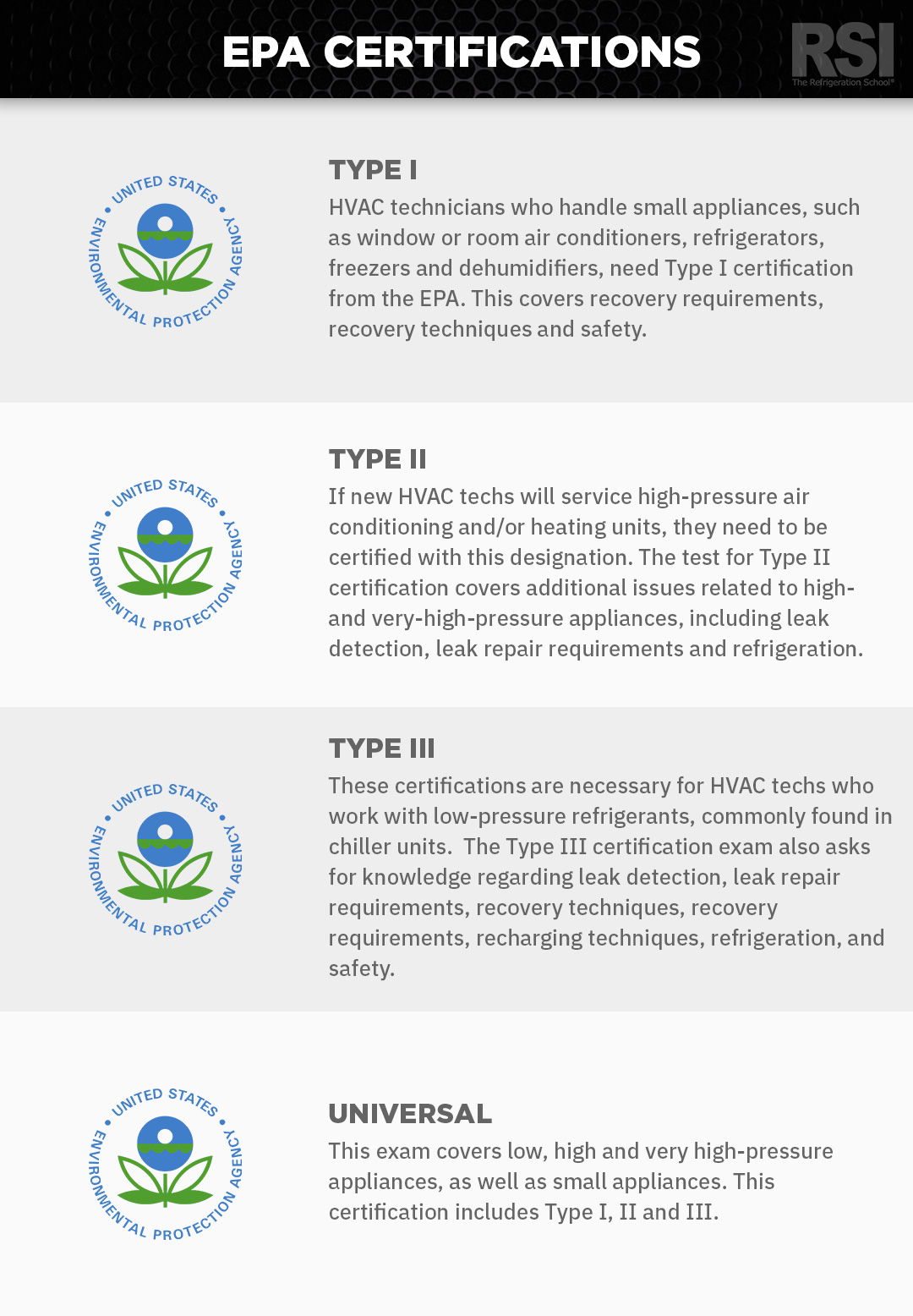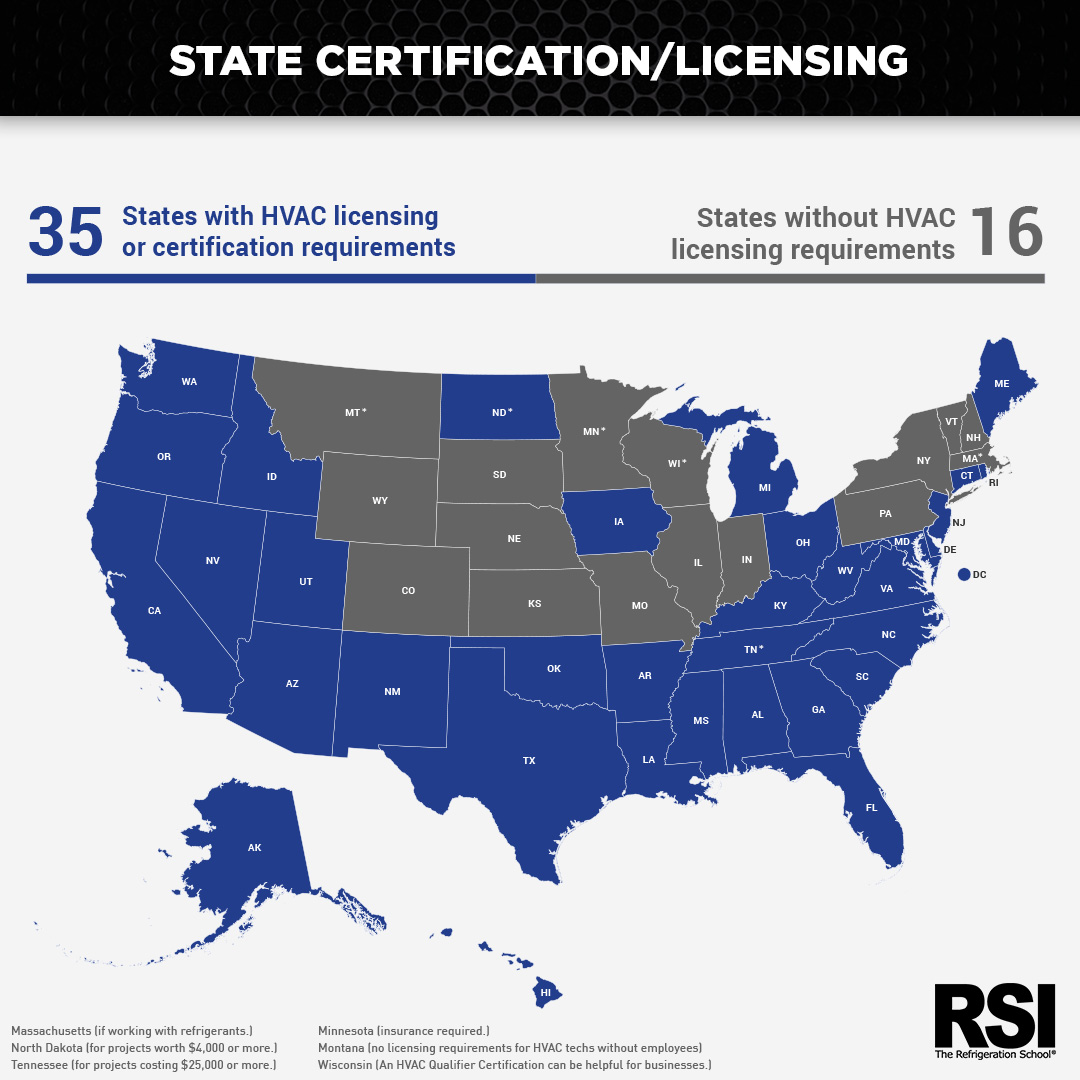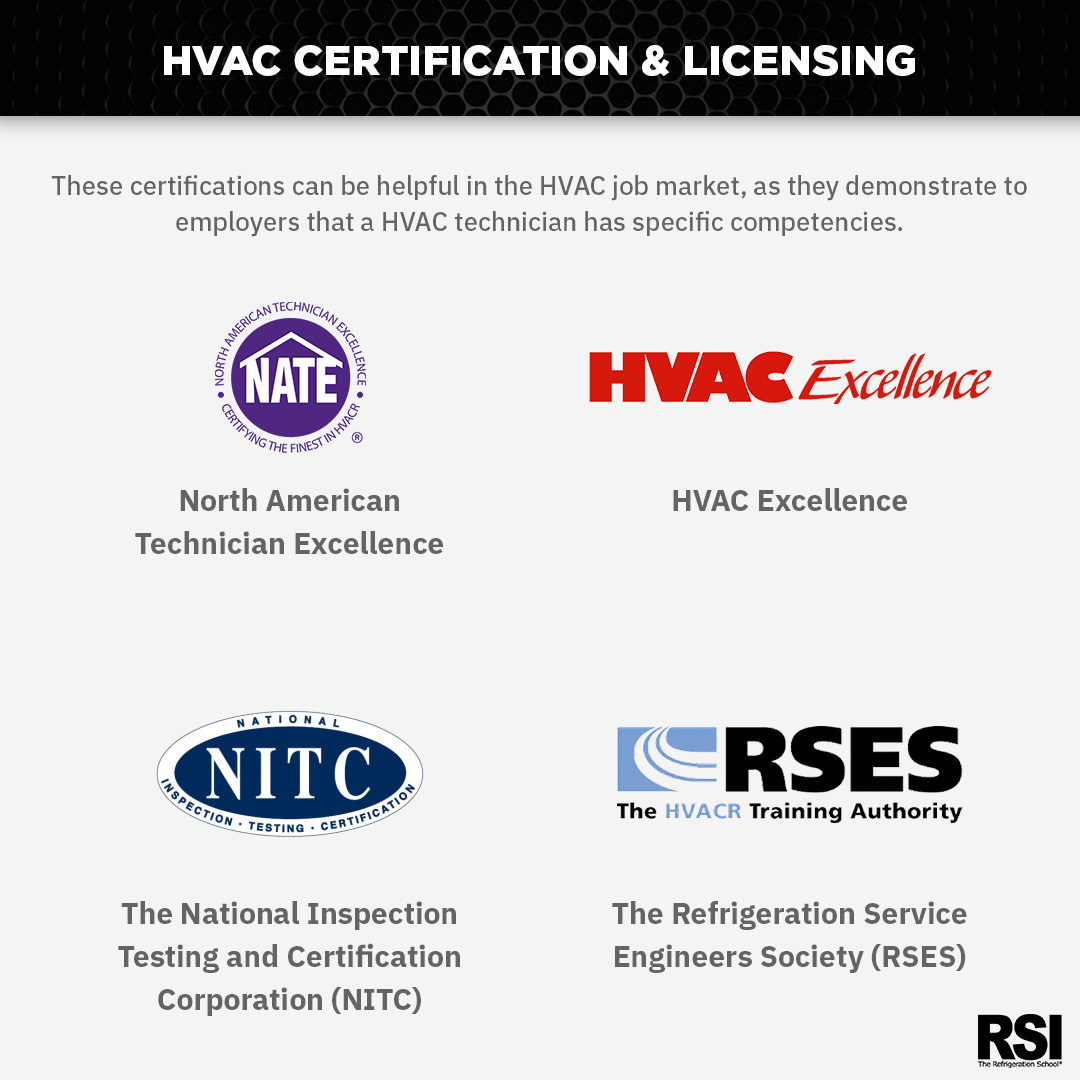Did you know that certifications can help you in your HVAC technician career journey? In order to work as a professional HVAC technician, certain licensing and certifications are required.
- EPA Section 608 Certification is required for all professionals working on systems containing refrigerants.
- Depending on which U.S. state you plan on working in, you may need special state licensing or certification.
- There are additional licensing tests for those who have experience in the field; passing specialized tests may make a candidate more desirable in the job market.
New HVAC technicians should figure out which particular credential type is needed for their career goals.
Get Started on the Path to a New Career
Fill out our form to learn how we can help you change your life.
Types of Certification for HVAC Technicians
There are many types of HVAC careers and jobs, and some may require specialized knowledge. For example, some technicians specialize in solar panels and may want to seek solar certifications and licenses.5 Certification can be a way to validate skills and knowledge in specific areas of the industry to potential employers. Technicians may seek certifications to obtain certain positions, climb the HVAC career ladder or make more money.2
Once they’ve completed an HVAC training program, HVAC techs prove their competency \ by taking certification and licensing exams.
The type of HVAC certification or license that is most beneficial depends on the career a technician chooses. Comparing HVAC careers may help with the decision.
1. EPA Certifications

EPA Section 608 Certification is part of the Clean Air Act and is required for anyone who maintains, services, repairs, or disposes of equipment that could release refrigerants into the atmosphere. This includes HVAC technicians who buy or work with any kind of refrigerants.
HVAC technicians must pass an exam specific to one of three specializations in order to become EPA certified:
- Small appliances
- High-pressure appliances
- Low-pressure appliances
They may also earn EPA certification in all types of equipment.
Section 608 Refrigerant Handling Laws for HVAC Technicians
- HVAC techs must have at least one of four types of EPA certification, depending on what type of equipment they work on.
- After certification, HVAC techs can only release tiny amounts of harmful refrigerants into the environment during the course of their work.
- Techs must follow specific guidelines for removing refrigerants from equipment, reclaiming refrigerants, and addressing refrigerant leaks.
- They also have to abide by record keeping rules, as well as refrigerant purchasing and disposal laws.6
The EPA offers four types of HVAC certifications. Each one is based on the kind of equipment you work on:
- Type I: Small Appliances
- Type II: Medium to Large High-Pressure Appliances
- Type III: Low-Pressure Appliances
- Universal: All Appliances
You’ll have to pass a different test to get each certification.7
Type I
HVAC technicians who handle small appliances, such as window or room air conditioners, refrigerators, freezers and dehumidifiers, need Type I certification from the EPA. This covers recovery requirements, recovery techniques and safety.1
Type II
If new HVAC techs will service high-pressure air conditioning and/or heating units, they need to be certified with this designation. The test for Type II certification covers additional issues related to high- and very-high-pressure appliances, including leak detection, leak repair requirements and refrigeration.
Type III
These certifications are necessary for HVAC techs who work with low-pressure refrigerants, commonly found in chiller units.2 The Type III certification exam also asks for knowledge regarding:
- Leak detection
- Leak repair requirements
- Recovery techniques
- Recovery requirements
- Recharging techniques
- Refrigeration
- Safety
Universal
This exam covers low, high and very high-pressure appliances, as well as small appliances. This certification includes Type I, II and III.
Reviewing EPA certification practice tests can give you a preview of the real ones. Plus, taking practice tests could be one way to prepare for the test. You can find practice tests online.9
2. State Certification and Licensing

Since state regulations can change, be sure to verify requirements for your state if you need to obtain a credential in order to work with HVAC systems.3
According to Next Insurance4, this is the breakdown of states without licensing requirements.
States without HVAC licensing requirements:
- Colorado
- Illinois
- Indiana
- Kansas
- Minnesota (insurance required)
- Missouri
- Nebraska
- New Hampshire
- New York
- Pennsylvania
- South Dakota
- Vermont
- Wisconsin
- Wyoming
Keep in mind that requirements sometimes vary for technicians and contractors. In Arizona, for example, contractors need licenses, but technicians don’t.
3. Additional Opportunities for HVAC Certification and Licensing

There are various specialized tests for HVAC technicians to become certified with specific types of equipment. Some require a certain amount of work experience or HVAC training before you can take them.
A number of organizations offer these types of exams:
North American Technician Excellence
The North American Technician Excellence (NATE) is an independent institute that provides certification for HVAC technicians.
The organization was developed and is supported by the HVAC industry, including the American Society of Heating, Refrigeration and Air Conditioning Engineers (ASHRAE) and the EPA.12
The only form of national HVAC certification accepted by HVAC contractors and manufacturers alike, NATE certification validates a technician’s working knowledge of HVAC systems and competency in specific areas of the field.13
Types of NATE Certifications
For entry level workers: NATE offers two types of certificates for technicians who are just entering or have only worked in the industry for a short time.
- Ready to Work
Individuals without formal HVAC training or instruction can take this online exam to test their knowledge of the field. - HVAC Support Technician
Techs with 6 to 12 months of experience may take the HVAC Support Technician exam.
For Experienced Professionals: NATE certifications for experienced professionals are divided into three categories, each with a recommended amount of relevant work experience before taking the test.
- Installation: 2 years of experience.
- Service: 2 years of experience.
- Senior: 5 years of experience.14
Each certification can be earned after passing two exams
- Core Exam: This exam covers general HVAC and construction subjects, such as tools of the trade; safety and basic science; and construction and electrical principles.15
- Specialty Exam: This exam focuses on specific areas of installation, service maintenance and/or repair of HVAC equipment.14
HVAC Excellence
HVAC Excellence is non-profit organization that offers specialty certifications that can help graduates of vocational training programs validate specific skills to potential employers and increase career opportunities. Certifications include:
- System Performance: covers combustion efficiency, airflow and refrigerant charging.
- Duct and Envelope Tests: duct leakage terminology and testing procedures via written and hands-on exams.
- Green Awareness: includes energy management, energy efficiency and comfort heating
and cooling combination systems. - Residential Heat Load Analyst: exams cover how to determine whether test takers can
properly identify structures’ heating and cooling loads. - R-410A: focuses on the handling, application and safety of R-410A systems.
- Residential Energy Auditor: written and hands-on tests required for certification.
- Hydrocarbon Refrigerant Certificate: a 50-question, open-book exam on Hydrocarbon
Refrigerants listed as acceptable for use and application under the EPA Significant New Alternative Program (SNAP).17
The specialty certifications from HVAC Excellence help professionals remain up to date with changes to codes and equipment while also addressing such topics as energy efficiency, sustainability, safety and warranty cost.17
The National Inspection Testing and Certification Corporation (NITC
NITC is a third-party provider that offers certifications in the piping industry. Specifically, the organization tests and certifies personnel in medical gas, plumbing, HVAC/R, fire protection and safety systems, as well as other fields that use piping. Certifications are available for several professional levels, including journey and master level. Furthermore, NITC certifies according to city, county and state government requirements.19
STAR HVAC/R Mastery Certification
The NITC’s STAR HVAC/R Mastery certification is for HVAC technicians who have the relevant skills and experience in operations, planning, blueprint reading, safety as well as the practical installation, repair and service of HVAC/R systems. The certification applies to residential, commercial and industrial settings. This encompasses design, construction, installation, retrofitting, repair and maintenance of the following systems:
- HVAC air handling.
- Ductwork.
- Refrigeration piping.
- Process piping heating and cooling.
A qualified Master Mechanic can perform any of these HVAC/R tasks alone or may supervise other individuals instead.20
NITC Certification Requirements
Candidates are expected to have completed HVAC/R training and bring a minimum of five years of documented work experience in installing and servicing HVAC/R equipment and piping systems. To pass the test, candidates need to obtain a score of at least 82 percent. The certification is valid for five years.
After five years, HVAC techs can get recertified. Recertification consists of passing a fifty- question multiple-choice exam. The exam is proctored, but candidates may use textbooks or HVAC/R manuals. The passing score for the recertification exam is 80 percent. The exam must be completed within two hours.20
- The Refrigeration Service Engineers Society (RSES): Exclusive to RSES members, this designation is earned after successfully passing a rigorous examination.The CM examination tests 18 categories of knowledge required in the installation and servicing of refrigeration and air conditioning equipment.
These certifications can be helpful in the HVAC job market, as they demonstrate to employers that a HVAC technician has specific competencies.
How Long is an HVAC Technician Program?
To help pass certifications, most technicians attend a formal HVAC trade school program. At RSI, it takes as little as 6 months to complete the Refrigeration Technologies program.
By attending full-time, you can complete classroom lectures and gain hands-on experience that will build your confidence in a short duration so you are not out of the workforce for long. Plus, if you have responsibilities during the day, RSI offers evening classes.
RSI also offers an associate degree in HVAC/R. The Associate of Occupational Studies in Mechanical Maintenance Engineering program takes 15 months to complete. This associate degree prepares HVAC/R technicians for entry-level jobs that require maintaining and servicing large, complex systems in the HVAC/R industry.
RSI Prepares You for HVAC Certification and More
Aside from being able to pass certifications, there are other benefits to getting an HVAC diploma:
Better Chances in the Job Market
Many HVAC technicians are competing for the same jobs, and having a competitive advantage like a diploma is a great way to show employers that you are dedicated to your craft.
Employers are always looking for trained HVAC technicians that need less on-the-job resources. That is why many employers look to RSI when filling open positions where they need highly skilled and fully trained HVAC technicians.
Higher Earning Potential
HVAC technicians who have completed a diploma program have higher earning potential and opportunities to move up the career ladder.
If you want to move on to the journeyman or master’s level, you must complete a minimum number of hours in the classroom and work in the field. Moving up to the journeyman and master’s level will come with it higher earning potential.
Hands-On Training
Part of the benefit of attending an HVAC diploma program is the hands-on training you receive. Not only can you put the theory you learn in the classroom to the test, but you can learn from your mistakes.
Instructors are available to mentor you through the educational process and give you the ability to make a mistake that won’t result in anything terrible. Hands-on training at RSI builds confidence in your HVAC skills so you are ready to start working on day one of your new career.
Career Services
One of the best benefits of a diploma program is the career services that we offer at RSI. Not only will you learn how to properly craft a resume, but you get interview preparation.
Plus, we work with employers who are interested in meeting our graduates and possibly giving them job interviews.
1 https://www.epa.gov/section608/section-608-technician-certification
2 http://www.hvwtech.com/hvac-certification/
3 https://www.bls.gov/ooh/installation-maintenance-and-repair/heating-air-conditioning-and-refrigeration-mechanics-and-installers.htm#tab-4
4 https://www.next-insurance.com/blog/hvac-license-requirements
5 https://www.bls.gov/ooh/installation-maintenance-and-repair/heating-air-conditioning-and-refrigeration-mechanics-and-installers.htm#tab-2
6 https://www.epa.gov/sites/production/files/2015-08/documents/section_608_of_the_clean_air_act.pdf
7 https://www.epa.gov/section608/section-608-technician-certification-0
8 https://www.epa.gov/section608/section-608-technician-certification-test-topics
9 https://www.hvaccertificationpracticetests.com/epa-608/
10 https://www.epa.gov/section608/section-608-technician-certification-programs
11 https://hvactraining101.com/hvac-technician-certification/
12 https://www.trane.com/residential/en/resources/glossary/what-is-nate-certification/
13 https://trademasters.com/about/nate-certification
14 https://www.natex.org/site/337/Technicians/Exams-Offered
15 https://www.natex.org/site/338/Technicians/Exams-Offered/Core-Test
16 https://www.escogroup.org/hvac/
17 https://www.escogroup.org/certifications/specialty.aspx
18 https://work.chron.com/upgrade-hvac-certification-20620.html
19 http://nationalitc.com/about-nitc.cfm
20 http://nationalitc.com/certifications/star-hvacr-mastery.cfm
21 https://www.next-insurance.com/blog/hvac-license-requirements/
22 https://www.bls.gov/ooh/installation-maintenance-and-repair/heating-air-conditioning-and-refrigeration-mechanics-and-installers.htm
This blog has been labeled as archived as it may no longer contain the most up-to-date data. For a list of all current blog posts, please visit our blog homepage at https://www.rsi.edu/blog/




